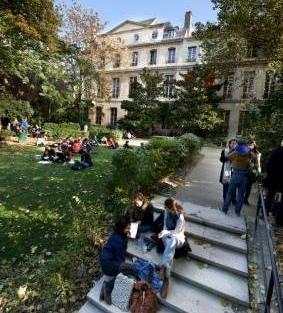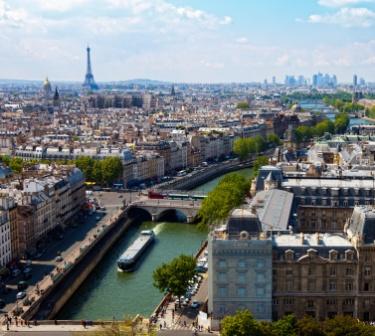We asked two international students at France’s Institut d'études politiques de Paris (Sciences Po) to share their experience of studying at the prestigious social sciences university.
Polina Piperkova, from Bulgaria, has just completed her undergraduate law degree at Sciences Po, and will be continuing at master’s level later this year. Parimal Satyal, from Nepal, joined Sciences Po’s School of Communication in 2012 after completing his undergraduate studies in the US.
See also: Sciences Po or LSE?
On Sciences Po courses…
“I applied to SciencesPo because it offers an excellent multidisciplinary program in social sciences,” Polina says. “The program fitted perfectly – I’ve always wanted to study law, but did not want to specialize from the very beginning. At the time, it seemed premature to choose a rigid and committing professional field, such as law, without having tried various disciplines I considered appealing – economics and political science.”
She adds, “Notions and concepts from these disciplines proved to be essential in understanding law better. For example, this year I trained in competition law at an international law firm, and my background in economics helped me handle cases in complex economic markets.”
 Meanwhile Parimal admits that he hadn’t initially considered Sciences Po for grad school, as he hadn’t realized how many different subjects it covers.
Meanwhile Parimal admits that he hadn’t initially considered Sciences Po for grad school, as he hadn’t realized how many different subjects it covers.
After spending time at the university as an exchange student, he says, “I loved Paris and could see myself returning… The School of Communication looked particularly attractive to me for its mélange of social sciences, technology, design, along with my own interests in media, design and culture.”
Now that he’s started the course, Parimal says “The most interesting thing about the program is its ability to attract tremendously influential, creative, unique, powerful personalities in the industry and in academia to teach classes and visit as guest speakers.
"This means two things: one, we get to learn from people who've had the experience and can speak from personal experience, which I find is valuable; and two, the program is very well connected, giving students the chance to meet people and discover opportunities in the network.”
Highlighting the international diversity at Sciences Po, Parimal adds, “In one particular class of 20-something students, about 16 nationalities were represented, many with very different ideas about what communication entails and how it affects corporate environments. The teacher for this class was able to really tap into this amazing diversity and show that students can learn as much from one another as from the course itself, something that seems obvious but is really hard to put into practice.”
On living in Paris…
“A city like Paris is a school on its own,” Polina says. “It is overwhelming and tiring, but full of opportunities and challenges. For example, the public transport is a challenge, but forces you to better organize yourself and be more efficient. The rich cultural life leads you to have more-balanced daily routine, as you are constantly tempted by different exhibitions, plays or events so you always end up doing something interesting during the week.”
She adds, “A favorite thing of mine is to stroll around Jardin of Luxembourg or to grab coffee with friends in small coffee shops in 5eme.”

Parimal continues, “Paris is a fantastic place to be a student: lots of young people (great if you’re single or you just like meeting really interesting people), excellent food, beautiful architecture and urban landscape and a good location within Europe.
“Sure, it may not be the most dynamic city (I've often heard that Berlin is more 'young') or the cheapest, but it's very animated and there's always something happening that doesn't cost much if you know where to look.”
On the challenges…
Academically, Polina says, “the most interesting part has also been the most challenging part” – referring to the broad range of course options available to students. “It is difficult to switch from various disciplines - it is not obvious to switch from studying history to statistics, and it can be at least distracting, if not inefficient.”
And in terms of adapting to life in Paris, she says, “The city is huge and sometimes soaks you with feelings of meaninglessness and unimportance – all big cities resemble in that regard.”
For Parimal, the biggest challenge in terms of the environment is the prevalence of smoking in social spaces. He adds, "Meeting people and settling in is much easier if you speak French, of course, but contrary to stereotypes about Parisian arrogance, I've found people to be mostly quite friendly and welcoming. "
Academically, he says, “The emphasis on strategic planning and advertising can sometimes be a little too much if that is not necessarily what you are interested in. The communication program offers a range of specializations in the second year, including in political and digital communication. While there are basics that are essential to anyone in the sector, it is occasionally a challenge to distance oneself from the point of view of looking at everything in terms of advertising and marketing.”